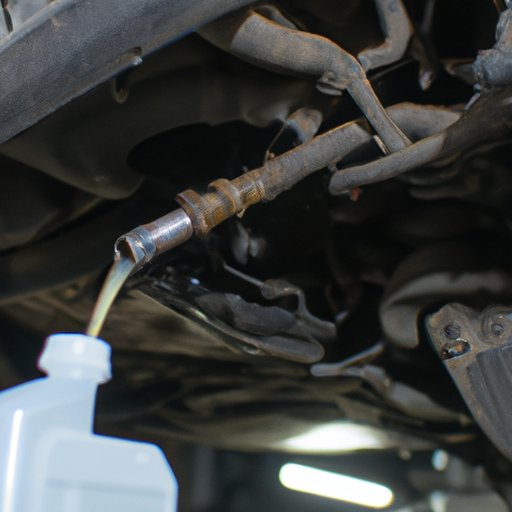
I. Introduction
As a responsible car owner, you know that regular maintenance is essential for keeping your vehicle running smoothly. And one of the most crucial maintenance tasks is changing your car’s oil. In this article, we’ll explore in detail what happens when you don’t change your oil regularly. You’ll learn about the potential consequences of ignoring this key maintenance task and the importance of staying on top of oil changes to keep your car running at its best.
II. The Silent Killer: What Happens When You Don’t Change Your Oil
Oil plays a crucial role in lubricating and protecting your car’s engine. Without it, the engine’s metal components can rub together, causing friction and heat. Over time, oil becomes contaminated with dirt and debris that accumulate inside the engine. If you don’t change your oil, the dirty oil will start to break down, losing its ability to properly lubricate the engine and leaving it vulnerable to damage.
The consequences of old, dirty oil can include lowered fuel efficiency, decreased engine performance, and even engine failure. Over time, oil can also thicken and turn into sludge, clogging the engine’s oil passages and filters. This restricts oil flow and increases the risk of engine damage.
III. Ignoring Your Oil Could Cost You Thousands: Here’s Why
If you neglect your oil changes, you could end up facing costly repairs down the line. Engine damage caused by low oil levels or poor lubrication can run into the thousands of dollars. Clogged oil filters can damage other parts of the engine, leading to further repairs and expenses.
For example, if your engine runs low on oil and starts overheating, you could end up with a blown head gasket. This repair can cost anywhere from $1,500 to $4,000. If you let your engine run with dirty oil for an extended period, you could end up with a seized engine that requires a full replacement – a cost that can easily run over $10,000.
IV. The Consequences of Neglecting Your Oil: A Cautionary Tale
Consider the case of Bill, a car owner who neglected his oil changes for years. At first, he noticed a slight decrease in performance, but he attributed it to the car’s age. As time went on, he began to experience more serious issues with the engine, like knocking sounds and smoking from the tailpipe.
By the time he brought the vehicle to a mechanic, the engine was already badly damaged. The mechanic discovered that the car had run for years on contaminated oil that had thickened and turned into sludge, clogging the engine and causing extensive damage to the metal components.
V. Why Skipping an Oil Change is the Worst Thing You Can Do for Your Car
As you can see from Bill’s story, ignoring your oil changes can have severe consequences for your car’s health and longevity. Regular maintenance is essential if you want to keep your vehicle running smoothly without costly repairs and downtime.
By staying on top of oil changes and other essential maintenance tasks, you can prevent engine damage and extend your car’s lifespan. This will also help your car retain its value and save you money in the long run.
VI. Be Honest: When Was the Last Time You Changed Your Oil?
Now that you understand the importance of regular oil changes, take a moment to assess your own habits. When was the last time you changed your oil? Do you keep track of your maintenance schedule?
It’s generally recommended to change your oil every 5,000 miles or so, but this can vary depending on your vehicle and driving conditions. Check your owner’s manual or consult with a mechanic to determine the right schedule for your car.
To make sure you stay on top of your oil changes, consider setting reminders in your calendar or using a maintenance app to track upcoming tasks. It’s a small step that can make a big difference in your car’s overall health and performance.
VII. Conclusion
Changing your car’s oil regularly may seem like a small task, but it’s one of the most important things you can do to keep your vehicle running at its best. Neglecting oil changes can lead to decreased engine performance, costly repairs, and even engine failure. Don’t wait until it’s too late to prioritize your car’s health – schedule regular oil changes today to keep your car running smoothly for years to come.





